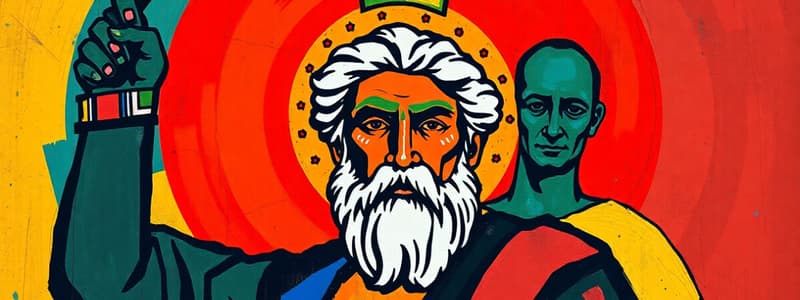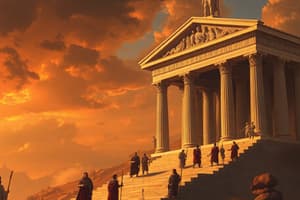Podcast
Questions and Answers
According to Plato, what is the primary characteristic that defines a tyrant?
According to Plato, what is the primary characteristic that defines a tyrant?
- A commitment to serving the common good through any means necessary.
- Unrestrained desire and the absence of reason or justice. (correct)
- An intellectual curiosity and pursuit of knowledge above all else.
- A strong adherence to traditional laws and customs.
In Plato's view, how does tyranny typically emerge?
In Plato's view, how does tyranny typically emerge?
- Through a council of elders carefully selecting the most qualified leader.
- Through a gradual and peaceful transition from aristocracy.
- From democracy, when the excessive desire for freedom leads to lawlessness. (correct)
- As a direct result of foreign invasion and military conquest.
Which of the following best describes Plato's view of the tyrant's happiness?
Which of the following best describes Plato's view of the tyrant's happiness?
- The tyrant is deeply unhappy because their desires are insatiable and they live in constant fear. (correct)
- The tyrant experiences true happiness due to their unlimited power.
- The tyrant's happiness is dependent on the well-being of their subjects.
- The tyrant is moderately content as long as they maintain control.
How does Plato use the Allegory of the Cave to explain the concept of tyranny?
How does Plato use the Allegory of the Cave to explain the concept of tyranny?
What role does philosophy play in preventing tyranny, according to Plato?
What role does philosophy play in preventing tyranny, according to Plato?
According to Plato, what are the three classes of desires that influence human behavior, and how does the tyrant relate to them?
According to Plato, what are the three classes of desires that influence human behavior, and how does the tyrant relate to them?
How does Plato contrast the state under tyranny with the ideal state ruled by a philosopher-king?
How does Plato contrast the state under tyranny with the ideal state ruled by a philosopher-king?
In Plato's analysis, how does a tyrant maintain control over the state?
In Plato's analysis, how does a tyrant maintain control over the state?
What is Plato's central argument regarding justice versus injustice, particularly in relation to the tyrant?
What is Plato's central argument regarding justice versus injustice, particularly in relation to the tyrant?
Plato outlines a progression of deteriorating regimes. What is the correct order of this descent, starting from the best?
Plato outlines a progression of deteriorating regimes. What is the correct order of this descent, starting from the best?
Flashcards
Tyranny
Tyranny
Worst form of government; ruled by a single person with absolute power, driven by base desires.
Lawless Desires
Lawless Desires
Insatiable and base; the driving force behind a tyrant’s cruel actions.
Tyrant's Unhappiness
Tyrant's Unhappiness
The idea that a tyrant is never happy because their desires are never satisfied.
State Under Tyranny
State Under Tyranny
Signup and view all the flashcards
Allegory of the Cave and Tyranny
Allegory of the Cave and Tyranny
Signup and view all the flashcards
Justice
Justice
Signup and view all the flashcards
Injustice
Injustice
Signup and view all the flashcards
Role of Philosophy
Role of Philosophy
Signup and view all the flashcards
Philosopher-King
Philosopher-King
Signup and view all the flashcards
Demagogue
Demagogue
Signup and view all the flashcards
Study Notes
- Plato explores tyranny in The Republic, Books VIII and IX, within a larger discussion about political regimes and character types.
- Tyranny is depicted as the worst government form, with the tyrant being the unhappiest, unlike the philosopher-king.
- Plato's study highlights the effects of unchecked desire and lack of reason/justice in both the state and individual.
The Descent into Tyranny
- Plato describes a decline of regimes: aristocracy/kingship, timocracy, oligarchy, democracy, and tyranny
- Each regime parallels a character where a soul aspect is dominant.
- Tyranny comes from democracy when extreme freedom-seeking causes lawlessness and a people-exploiting demagogue.
- The demagogue poses as a people's champion but becomes a tyrant, crushing opposition to secure power.
The Nature of the Tyrant
- The tyrant is led by base, unlawful desires and lacks reason/justice.
- The tyrannical person is a slave to desires, fulfilling them regardless of morality or others' welfare.
- Three desire classes exist:
- Necessary: natural, survival-essential.
- Unnecessary: non-essential, reason-controllable.
- Lawless: excessive, irrational, harmful.
- The tyrant is ruled by lawless desires, leading to terrible actions for self-gratification.
The Tyrant's Unhappiness
- Despite power, Plato says the tyrant is the unhappiest person.
- Tyrants are never satisfied because desires are endless.
- They constantly fear being overthrown, using violence and oppression to stay in control.
- Tyrants are isolated, distrustful, knowing others are driven by selfish desires as they are.
The State Under Tyranny
- Under tyranny, the state is subject to the tyrant's whims.
- There's no rule of law, justice, or freedom.
- The tyrant uses fear/violence to control people, stopping any resistance.
- The state suffers internal conflict and instability from the tyrant's paranoia/cruelty.
- Tyranny causes impoverishment and degradation as the tyrant exploits people for personal gain.
The Allegory of the Cave and Tyranny
- Plato's Allegory of the Cave helps understand tyranny.
- Cave prisoners symbolize those unaware of true reality, easily manipulated.
- The tyrant is like an escaped prisoner who uses limited understanding to control other prisoners instead of seeking real knowledge.
- The tyrant is still stuck in illusions, unable to understand true justice/goodness.
Justice vs. Injustice
- Plato compares the lives of just and unjust people, especially tyrants.
- Justice is inherently good, and just people are happier regardless of circumstances.
- Even if unjust people seem successful, their souls are full of turmoil and dissatisfaction.
- The tyrant, as the epitome of injustice, is the most miserable.
The Role of Philosophy
- Plato sees philosophy as key to escaping political decay and tyranny.
- Only through reason/knowledge can individuals/societies find true justice/happiness.
- The philosopher-king, guided by reason and knowledge of the Forms, is the ideal leader for virtue and well-being.
- Philosophy helps understand justice/good and resist tyrannical power.
Key Takeaways
- Tyranny is the worst government, marked by lawlessness, oppression, and base desires.
- The tyrant is the unhappiest, controlled by insatiable desires and constant fear.
- Tyranny comes from democracy's decay when freedom leads to chaos and a demagogue's rise.
- Philosophy is essential for understanding justice and preventing tyranny.
- Plato's analysis warns against unchecked power and highlights reason/virtue for individuals/societies.
Studying That Suits You
Use AI to generate personalized quizzes and flashcards to suit your learning preferences.




